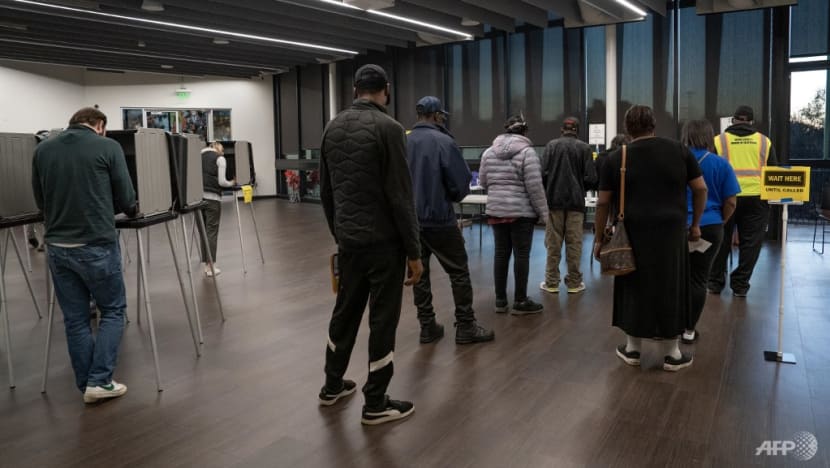Commentary: Republican or Democrat? The party label is what matters most to voters
Americans have cast millions of votes in the midterm elections. They know a lot more but care a lot less about the backgrounds and policies of the politicians seeking their vote, says David A Hopkins for Bloomberg Opinion.

People wait in line to vote at a polling place on Nov 8, 2022 in Raleigh, North Carolina, United States. (Photo: Allison Joyce/Getty Images/AFP)
BOSTON: It’s never been easier for Americans to learn about the policy positions and personal character of the men and women seeking their vote. And never have these attributes mattered less: For most voters, the most important fact about a candidate is which party they belong to.
When the Information Age coincides with the Age of Polarisation, such paradoxes are inevitable.
The proliferation of coverage on cable television, the explosion of campaign advertising and the easy access to content provided by social media and other digital sources have revolutionised the political information universe. Candidates’ biographies and policy stances are a quick Google search away.
Even people who don’t make a special effort to inform themselves are still exposed to news headlines and advertising from candidates, parties and super PACs on both sides, some of which are informed by aggressive opposition research that is often unflattering or unreliable.
Americans are also becoming increasingly aware of candidates beyond their local jurisdictions. As recently as the 1980s and 1990s, it was rare for a challenger to a member of Congress or state-level office seeker to become a national political figure. Now gubernatorial candidates can gain national visibility, such as Kari Lake of Arizona and Stacey Abrams of Georgia.
Attentive citizens can easily inform themselves about candidates and races in faraway places. They can even send financial donations across state lines to their favourite contenders through fundraising websites like ActBlue or WinRed.
AMERICANS PREFER A SINGLE PARTY’S NOMINEES
But the rising power of partisanship in the US electorate, fuelled largely by increasingly negative views of the partisan opposition, has left a shrinking pool of voters who are willing to deviate from their customary electoral habits to support an individual candidate with especially attractive personal traits — or to reject a particularly unappealing option at the ballot box.
The share of House districts that delivered a split outcome, simultaneously supporting candidates of opposite parties in presidential and congressional voting, declined from 33 per cent in 1980, to 20 per cent in 2000, to just 4 per cent in 2020.
With Americans now very likely to prefer a single party’s nominees up and down the ballot, the influence of individual candidates on electoral outcomes has never been lower.
Because both congressional chambers are narrowly divided between the parties, it’s only natural — and even logical — for voters to treat individual House and Senate races as proxy battles for majority control of the institution, reasoning that their own representatives should be treated as votes for or against polarising national party leaders such as House Speaker Nancy Pelosi and Senate Minority Leader Mitch McConnell.
But party-line voting is on the rise even in state and local elections, where these considerations don’t apply. At every level of government, politicians are marking territories as red or blue.
REPUBLICAN CANDIDATE QUALITY WON’T HELP DEMOCRATS
This year, many Democrats took comfort in the belief that the normal disadvantage they faced as the president’s party in a congressional midterm election could be effectively blunted by a countervailing mismatch in candidate quality.
They hoped that the flawed or untested candidates that emerged as Republican nominees in a number of Senate races — including Mehmet Oz in Pennsylvania, Blake Masters in Arizona, Don Bolduc in New Hampshire and Herschel Walker in Georgia — would self-destruct under the bright lights of national politics.
Democratic-aligned groups even intervened in Republican primaries on behalf of candidates judged to be weak general election opponents, assuming that voters in swing districts would punish these candidates’ perceived ideological extremism or lack of qualification.
Many of the candidates Democrats scorned have indeed encountered rocky terrain on the campaign trail. Oz has been criticised for moving to Pennsylvania simply to run for office. Masters and Bolduc have been attacked for their willingness to consider the privatisation of Social Security and Medicare, respectively. Walker has faced a series of challenges, including accusations from two women that he funded their abortions.
These developments have received extensive media coverage and served as fodder for volleys of Democratic attack ads.
But as the Republican Party's position in the polls remained highly competitive in the final days of the campaign, Democrats are learning to their dismay that most Americans today vote for the party label — no matter who happens to be wearing it.
David A Hopkins is an associate professor of political science at Boston College and the author of Red Fighting Blue: How Geography And Electoral Rules Polarize American Politics.
















